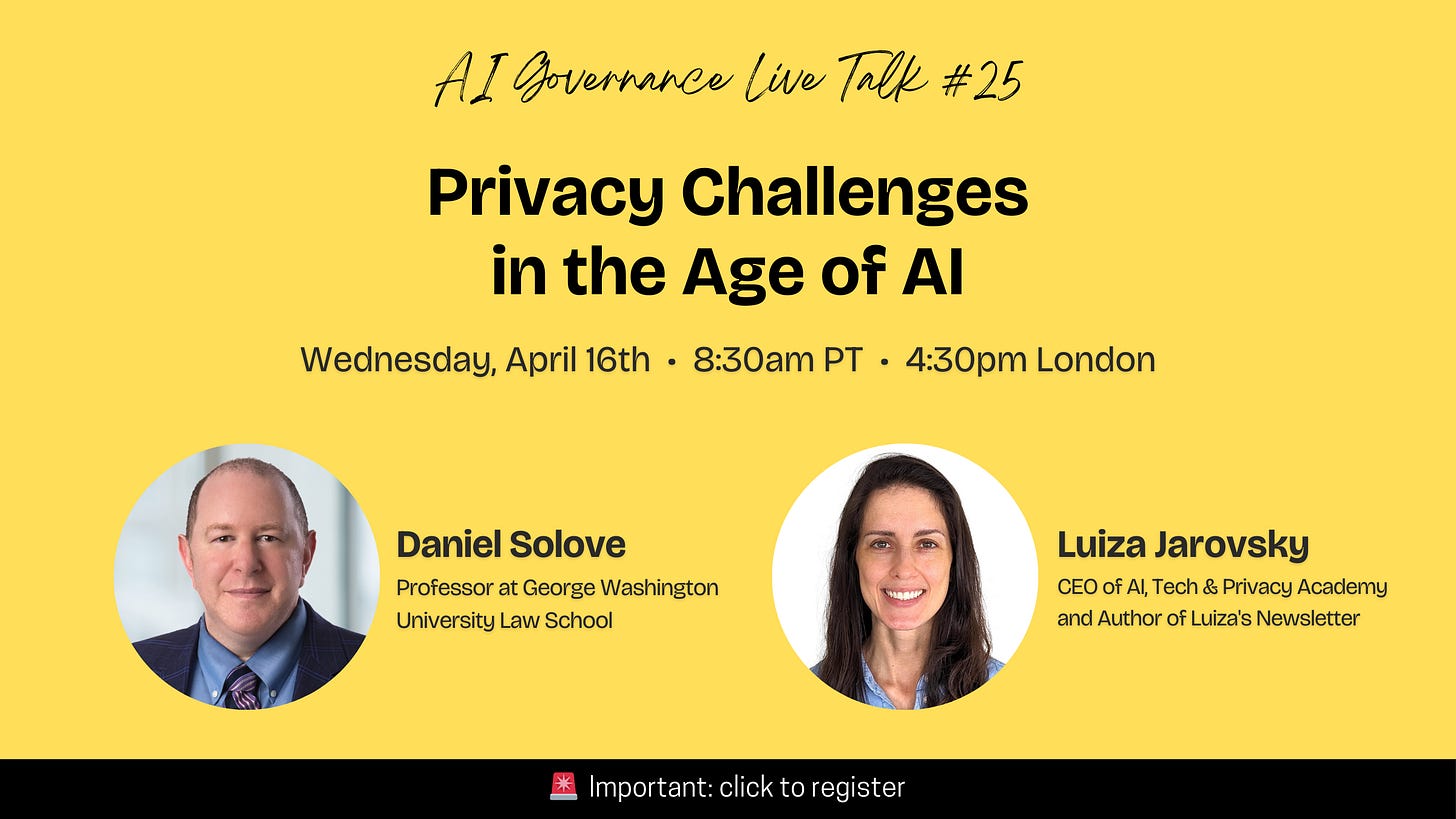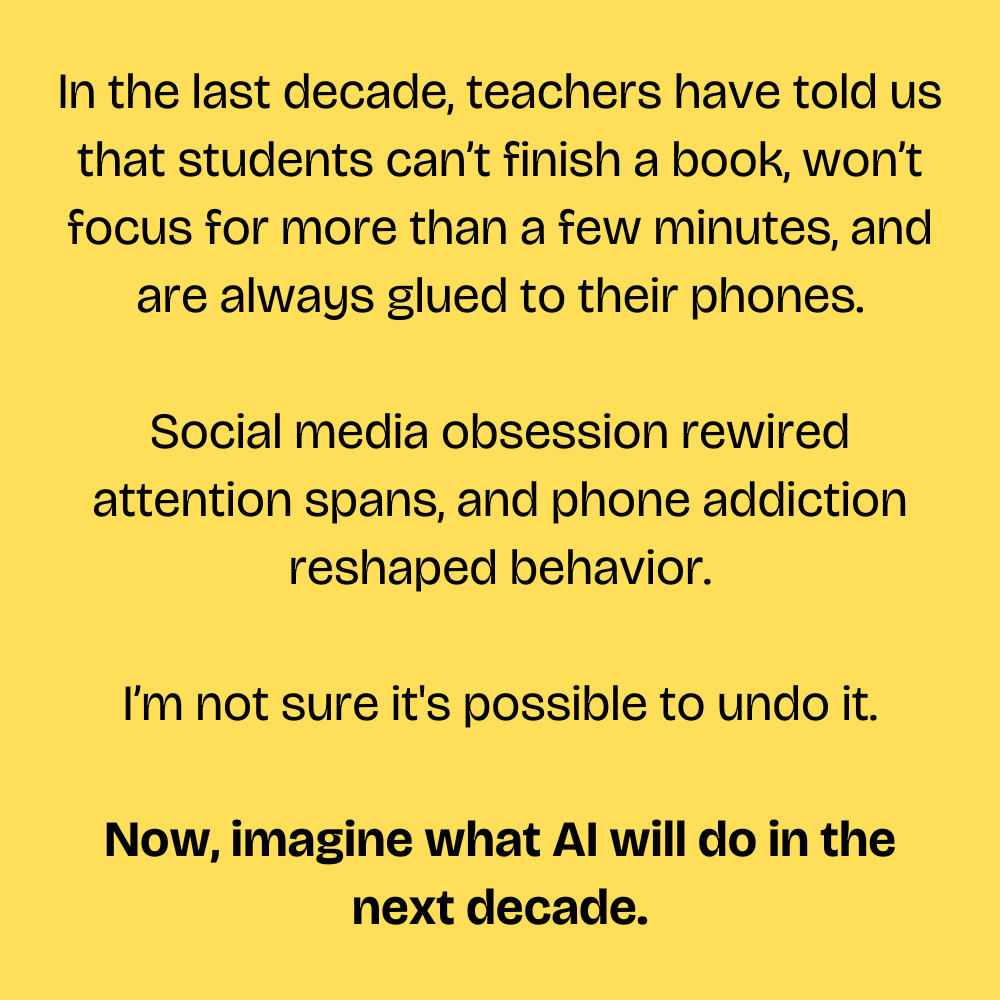✂️ Europe Will "Simplify" the GDPR
AI's Legal and Ethical Challenges | Edition #188
Hi, Luiza Jarovsky here. Welcome to our 188th edition, read by 57,700+ subscribers. It's great to have you here! In addition to this free edition, paid subscribers get full access to all my analyses on AI's legal and ethical challenges, published 3 to 4 times a week. Don’t miss out!
For more: AI Governance Training | Live Talks | AI Book Club | Job Board
👉 A special thanks to TrustWorks, this edition's sponsor. Check them out:
Exclusively for Luiza’s subscribers – only in April! Get free access to TrustWorks’ award-winning AI Governance platform. Instantly detect AI use across your organization (including shadow AI), streamline risk classification under the EU AI Act, and unlock actionable insights for AI risk management. Don't miss this limited-time offer: start your free trial.
*Promote your brand to 57,700+ readers: Sponsor us (Next spot: July 10)
✂️ Europe Will "Simplify" the GDPR
So it looks like the rumors are true: in a few weeks, the EU will present a proposal to simplify the General Data Protection Regulation (GDPR), its most prominent data protection law.
We still do not have details about the proposed changes or how they will be implemented. We know that the goals are to:
simplify existing rules to reduce the time and effort companies spend complying with EU laws, with a focus on small and medium businesses;
increase EU competitiveness, especially in light of the AI race.
The EU seems to have effectively changed its narrative and tone on tech regulation and the protection of fundamental rights, and now it wants to implement its new vision.
For many, this might seem surprising or even shocking. But for those who have been reading my analyses, it looks more like an expected outcome after an evident narrative shift in recent months, which I called The AI Governance Tornado.
There were two important milestones that led to this narrative shift: the Draghi report on EU competitiveness and the latest developments in the AI race.
1. The Draghi Report
Mario Draghi is the former European Central Bank President. The EU Commission asked him to prepare a report outlining his personal vision for the future of European competitiveness.
His report, from September 2024, presented a harsh reality for the future of European competitiveness if no changes were made. Here are two quotes from the report:
“(…) while the ambitions of the EU’s GDPR and AI Act are commendable, their complexity and risk of overlaps and inconsistencies can undermine developments in the field of AI by EU industry actors. The differences among Member States in the implementation and enforcement of the GDPR (…), as well as overlaps and areas of potential inconsistency with the provisions of the AI Act create the risk of European companies being excluded from early AI innovations because of uncertainty of regulatory frameworks as well as higher burdens for EU researchers and innovators to develop homegrown AI.“
and
“As in global AI competition ‘winner takes most’ dynamics are already prevailing, the EU faces now an unavoidable trade-off between stronger ex ante regulatory safeguards for fundamental rights and product safety, and more regulatory light-handed rules to promote EU investment and innovation, e.g. through sandboxing, without lowering consumer standards. This calls for developing simplified rules and enforcing harmonised implementation of the GDPR in the Member States, while removing regulatory overlaps with the AI Act [as detailed in the Governance Chapter]. This would ensure that EU companies are not penalised in the development and adoption of frontier AI.”
The Draghi report resonated with the growing dissatisfaction among tech companies over EU compliance rules, especially the GDPR, which became clear during the EU AI Act's legislative process.
2. The AI Race: Latest Developments
First, as I wrote in recent weeks about DeepSeek and Manus AI, China seems to have entered the AI race strongly, dropping prices and setting open-source as a new golden standard.
American companies are under heavy pressure to show that they can achieve similar or better results. The EU is under pressure to show a significant presence in the race, as it's currently lagging behind.
Second, the political and regulatory changes implemented by the Trump administration in the context of the AI race also seem to have increased pressure on the EU. This was visible at the AI Summit in February this year. Some quotes from the event:
French President Emmanuel Macron said: "Europe is going to accelerate; France is going to accelerate - and so for us, France, we're announcing tomorrow at this summit €109 billion of investment in AI over the next few years."
Ursula von der Leyen, President of the European Commission, said: "We want Europe to be one of the leading AI continents. And this means embracing a way of life where AI is everywhere. AI can help us boost our competitiveness, protect our security, shore up public health, and make access to knowledge and information more democratic. And this is what you – entrepreneurs and researchers, investors and business leaders – are showcasing here in Paris. This is a glimpse of the AI continent we want to become."
U.S. Vice President JD Vance stated: “The Trump administration is troubled by reports that some foreign governments are considering tightening the screws on U.S. tech companies with international footprints. Now America cannot and will not accept that.”
Henna Virkkunen, the EU "digital chief," promised the audience that the EU would simplify its rules and apply them in a “business-friendly way."
On the same day the AI Summit ended, the EU announced the withdrawal of the EU Liability Directive.
A few weeks later, the EU announced that it would present a proposal to simplify the GDPR.
The EU has bent to economic and political external pressure, and its narrative and tone have definitely changed. The chosen way to relieve the pressure is to “simplify” the GDPR. From a legal perspective, it's unclear to me what's coming.
*
Paid subscribers receive my timely, critical analyses on AI's legal and ethical aspects 3-4 times a week. Don't miss out!
🌿 AI Governance Training: Spring Cohort
If you enjoy my newsletter and would like to learn more about AI's legal and ethical challenges in an in-depth and interactive way, I invite you to join the 20th or 21st cohort of my AI Governance Training in May or June.
The program includes 15 hours of live online sessions with me (constantly updated), curated self-study materials, quizzes, a 1-year paid subscription to this newsletter, a networking session with peers, a training certificate, and 13 CPE credits.
I designed this training to help participants critically understand AI's legal and ethical challenges, going beyond standard certifications and checklists. I have already trained 1,150+ professionals (testimonials here), and cohorts usually fill up fast (only 30 seats). Secure your spot:
*We offer discounts for students, NGO members, and individuals in career transition. To apply, fill out this form.
🪤 Manipulative Design in AI: CharacterAI
If there was one AI company that should have become a model of ethical, safe, and legal design practices in AI, it's CharacterAI. However, many of its design practices remain manipulative, unethical, and unsafe. Read my article.
🧾 AI Receipts and the End of Trust
AI-generated forgery will make existing systems of trust, identification, and authentication collapse, and society is not ready for that. We must act quickly and proactively. Read my article.
🪃 Anthropic's Fair Use Boomerang
Anthropic's latest fair use argument might boomerang against them, setting an extremely high standard that the company will struggle to meet (but that would benefit content creators). Read my article.
🎞️ The Ghibli Effect and AI Copyright
In the last few days, the internet has been flooded with Ghibli-style AI images. This viral trend represents a decisive moment in the AI copyright debate. Read my article.
🕶 OpenAI's Viral Privacy Trick
Most people haven't realized that the Ghibli Effect is not only an AI copyright controversy but also OpenAI's PR trick to get access to a massive trove of personal images. Read my article.
📚 AI Book Club: What Are You Reading?
We've recently announced our 19th recommended book: "On Privacy and Technology," by Daniel Solove. See the full book list and join 2,500+ readers who never miss our book recommendations: Join the Book Club.
💼 Looking for a Job in the Field?
Each week, we send job seekers an email alert with new roles in AI governance and privacy. Increase your chances by exploring our global job board and subscribing to our free weekly alerts: Receive Job Alerts.
🎙️ AI Governance Live Talk #25
If you're interested in the intersection of privacy and AI, you can't miss my upcoming live event. Here's why:
Prof. Daniel Solove is a globally acclaimed privacy scholar and expert, has written numerous seminal books and articles on the subject, and is among the most cited legal scholars of all time.
In this live talk, we'll discuss his new book, "On Privacy and Technology," and hot topics at the intersection of privacy and AI. We'll also 🎉 celebrate his 25+ years of invaluable contributions to the field of privacy.
👉 To participate live, register here – it's free and open to all.
👉 To watch the recording of all my previous conversations with global experts in privacy and AI, check out my YouTube channel.
🚨 Unpopular Opinion
AI will make us dumber:
This is something that worries me deeply, as we have no idea of the long-term consequences of a society that delegates most intellectual tasks to AI.
👉 You're welcome to share your thoughts on the topic via LinkedIn, Bluesky, X, or in the comments below.
See you soon!
Luiza







Great article. Can the EU truly "simplify" and "harmonise" GDPR to boost competition & innovation (and keep US happy)?
Simplifying GDPR may streamline business, but it raises a crucial question: can innovation and regulation still meaningfully coexist, or are we watching the beginning of a values trade-off masked as modernisation?